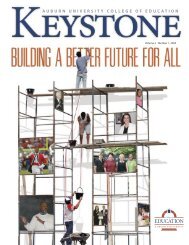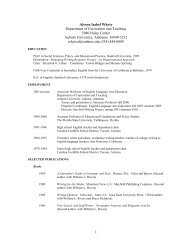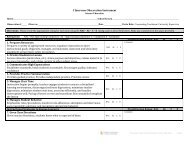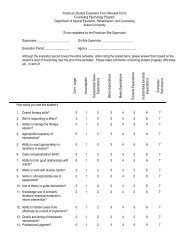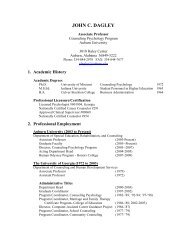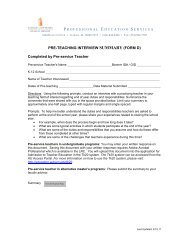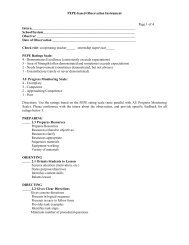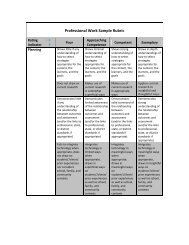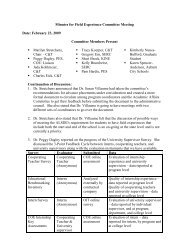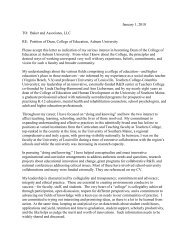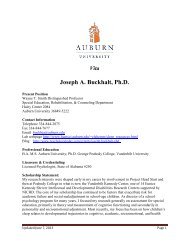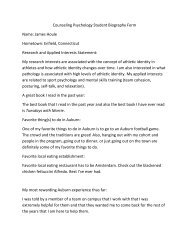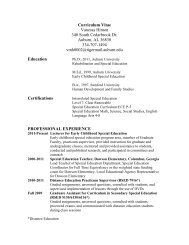8.0MB - College of Education - Auburn University
8.0MB - College of Education - Auburn University
8.0MB - College of Education - Auburn University
- No tags were found...
You also want an ePaper? Increase the reach of your titles
YUMPU automatically turns print PDFs into web optimized ePapers that Google loves.
Music education strikesa chord through use <strong>of</strong>instructional technology,distance educationThe department’s Music <strong>Education</strong> program, underthe direction <strong>of</strong> Dr. Kimberly Walls, pr<strong>of</strong>essor andprogram coordinator, has enjoyed national interestin <strong>Auburn</strong>’s efforts to integratecampus technology and distancebasedinstruction.At the invitation <strong>of</strong> the <strong>College</strong>Music Society and the Associationfor Technology in Music Instruction,Walls, along with Sid Hearn,a doctoral student in music education,and Dr. Doug Rosener, assistantpr<strong>of</strong>essor in AU’s Department<strong>of</strong> Music, demonstrated its distancelearning efforts at the CMS49th National Conference in SanAntonio, Texas. During a special September 2006 pre-conferenceboot camp on music video conferencing, collaborationand convergence entitled “Bring the Outside World intoyour Music Studio and Classroom,” the three showed howtwo courses in the department’s distance learning graduateprogram were taught with a combination <strong>of</strong> Internet videoconferencing and streaming video.The program’s Guitar Classroom Methods and PercussionInstruments Techniques courses allow both local and distance-educationstudents to see and hear instructors coachingindividual students using real-time video. Music teachers enrolledin the two courses hone skills in instrument performingand teaching methods.Walls is also among music educators invited as a discussantin “Toward Tanglewood II: The Effects <strong>of</strong> Technologyon Music Learning” at the <strong>University</strong> <strong>of</strong> Minnesota. In thissatellite conference, discussants will prepare a position paperfor “Tanglewood II: A Symposium on Charting the Future,”which is sponsored by Boston <strong>University</strong>.Tanglewood I, held in 1967, was an international watershedevent for philosophy and curriculum in music education.Tanglewood II recognizes the 40th anniversary <strong>of</strong> theoriginal symposium. Goals <strong>of</strong> the conference are “to cultivatea new understanding <strong>of</strong> music learning, to examine values <strong>of</strong>music in culture and its effect on transmission processes andhow schools, public and private at all levels, can meet the decadesahead with a deeper understanding <strong>of</strong> the role they canplay in supporting a musical future.”Oxford Round Table invitesAU <strong>Education</strong> pr<strong>of</strong>essorto present paperDr. Steve Silvern, pr<strong>of</strong>essor<strong>of</strong> early childhood education inthe Department <strong>of</strong> Curriculumand Teaching, was invited toparticipate in the spring 2007Oxford Round Table. Held inOxford, England, this prestigiousconference’s goal is topromote human advancementand understanding through theimprovement <strong>of</strong> education.Participants are selectedthrough several screening processes,including nominations by previous Round Tableparticipants and recommendations by Round Table directors.The first Round Table met in August 1989; attendancewas limited to ministers <strong>of</strong> education from severalnations and numerous governors from the United States.Since its inception, the Round Table has grown to includemembers <strong>of</strong> Parliament, executive <strong>of</strong>ficers <strong>of</strong> internationalcorporations, educational administrators, attorneys andacademicians from major universities.Silvern, one <strong>of</strong> only 10 conference speakers, presentedhis paper entitled “Co-developing Mind and Spirit.”This paper explored how educators can pay attention tochildren’s developing spirit and improve reasoning by engagingthem in interactions that respect their developinglogic <strong>of</strong> the spirit and <strong>of</strong> the logic <strong>of</strong> others.Team-Math duo leads innational organizationAs the directors <strong>of</strong> TEAM-Math, Curriculum andTeaching faculty members Dr. Marilyn Strutchens, associatepr<strong>of</strong>essor, and Dr. W. Gary Martin, pr<strong>of</strong>essor, provideoutreach and service to the East Alabama region.While the TEAM-Math program has acquired regionaland statewide attention, Strutchens and Martin have receivednational recognition for their work in the field <strong>of</strong>mathematics education. Strutchens was recently appointedas chair <strong>of</strong> the National Council <strong>of</strong> Teachers <strong>of</strong> Mathematics’(NCTM) Research Committee for the 2007-2008academic year.In January 2007, Martin was elected treasurer <strong>of</strong> theAssociation <strong>of</strong> Mathematics Teacher Educators, in additionto his service on NCTM’s high school curriculumtask force.Together, Strutchens and Martin also served as co-editorsfor NCTM’s 2007 yearbook, The Learning <strong>of</strong> Mathematics:69th NCTM Yearbook.26 Building A Better Future for All education.auburn.edu



